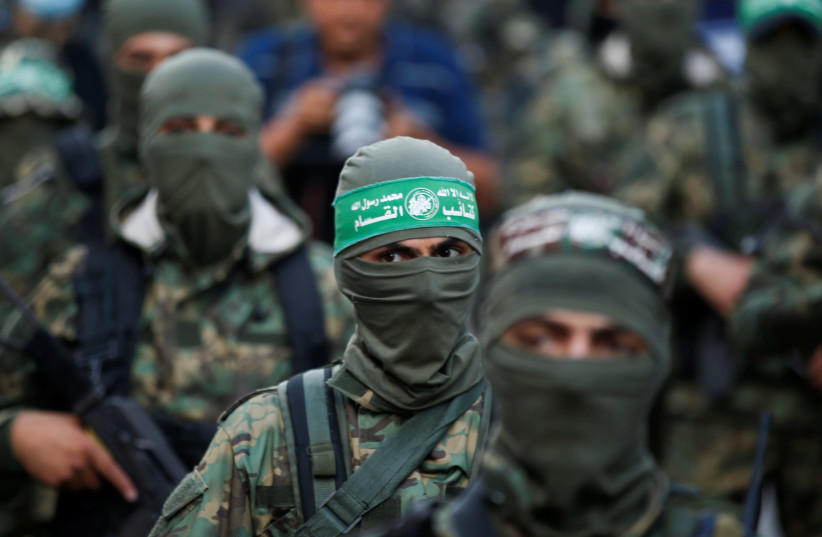Hamas talks tough ahead of possible Rafah battle
Hamas is talking tough ahead of a possible Israeli operation in eastern Rafah. Israel called for residents to evacuate several areas in eastern Rafah near the Israeli border. It comes a day after Hamas launched 114mm rockets at Israel and killed three soldiers and wounded other soldiers.
Now pro-Iran media is highlighting Hamas preparations and how Hamas is trying to get the international community involved and also mobilize pro-Iran proxies in the region. This could be a ”perfect storm” against Israel, one pro-Iran report at Al-Mayadeen says.
Hamas said that its “resistance” is fully prepared for any attack, the pro-Iran Al-Mayadeen said, reflecting a Hamas statement. Hamas called on UNRWA and other NGOs to “remain in their place” in Rafah.
Hamas says there are 1.5 million people in Rafah and it seems Hamas wants to hide behind them if there is a battle. Hamas is also relying on the Palestinian Authority to prevent an operation in Rafah.
The Hamas access to influential NGOs, countries and the PA illustrate how Hamas has many backers regionally and globally. The group is trying to pull out all the stops to not be evicted from Rafah.

This is likely because Hamas is hiding tunnels and weapons manufacturing in Rafah. It wants access to humanitarian aid also so it can distribute the aid. Hamas has used control over aid for many years to control Gaza. Hamas also called on the US to “intervene.”
Rafah crossing area operating as usual
Reports at Al-Mayadeen said that the Rafah crossing area was operating as usual. Hamas also indicated that it was blaming Israel for ceasefire talks falling apart. This is interesting because it appears to mean that one of the pre-requisites of the talks was for Israel to reduce the intensity of its operations.
Hamas appeared to assert that because Israel was poised to carry out a new operation that this meant Israel had come to the ceasefire talks “deceitfully.” What was the deceit? If Israel went to the talks with the understanding Israel would be withdrawing from Gaza and not launch new ground attacks then this was not communicated to the public.
However, it is clear that over the last two months Israel has reduced operations in Gaza and left much of Gaza, enabling Hamas to return. This is obviously the Hamas goal. Hamas appears outraged that Israel would now actually consider operating in Rafah.
Hamas believes that the evacuation of eastern Rafah is now a “test” for the international community and Hamas thinks that any attack can be prevented. Hamas is saying that this means US “credibility” is at stake, according to the article at Al-Mayadeen. Once again, this appears to mean that Hamas leadership abroad conveyed to Hamas in Gaza that an operation in Rafah would not take place and it appears Hamas had demanded some kind of assurances about Rafah from the US and likely from Hamas backers and hosts in Doha and Ankara. This leads to serious questions about what Hamas is thinking and how it believes it is winning the war.
A second report at Al-Mayadeen suggests that Iran and its proxies in Lebanon, Yemen, Iraq, Syria and other places are closely watching the Rafah developments. The report calls the looming battle of Rafah a “perfect storm” against Israel.
The report goes on to consult an expert who said that “the threat to attack the Rafah area is an exaggeration to put pressure on the negotiations and improve their [Israel’s] conditions to achieve a victory through negotiations, since the promised practical victory on the ground in Gaza has not and will not be achieved.”
However, the report says that any attack on Rafah could lead to a wider regional conflict. It also says the US presidential election could affect Washington’s decisions. Finally, the article argues that the region’s pro-Iran groups operate over 2 million square kilometers, which makes the “theatre of operations” extensive.
It appears the Iran proxies assume that any Israeli operation will be coordinated with Egypt. The report also says that there could be the outbreak of a “wide-scale war,” and Israel “will be exposed to attack from several fronts (Lebanon, Syria, and Gaza, of course, and Iraq and Yemen, and possibly From Iran), and the matter will be carried out in stages.” Iran believes that global public opinion is on the side of Hamas and that it can use this to its benefit. Iran believes it is winning.





Comments are closed.